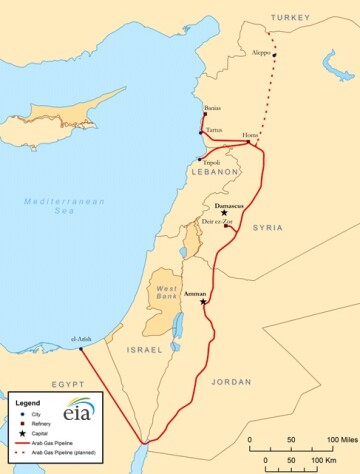Egypt says it is stopping gas supplies to the Egypt Liquefied Natural Gas (ELNG) export terminal at Idku near Alexandria immediately and that it will supply gas to the Damietta LNG plant only until year end as it prepares to redirect surplus gas exports to Lebanon via the Arab Gas Pipeline.
Jordan’s Ministry of Energy and Mineral Resources announced in early September it would deliver Egyptian gas to Lebanon after oil ministers of nations responsible for the Arab Gas Pipeline (Egypt, Jordan, Syria, and Lebanon) met in Amman to agree on a regional response to Lebanon’s ongoing fuel and electricity crisis, local media reported.
The English language news site Egypttoday.com quoted Egyptian Minister Tarek El Molla as saying, “Egypt is working to speed up coordination for delivering Egyptian natural gas to Lebanon through Jordan and Syria.”
Lebanon is in a state of economic collapse that the World Bank has called one of the worst on record, and, because it lacks foreign currency to pay for energy imports, the country was forced to switch off its two main power plants in July for lack of fuel, plunging the country into a near total blackout.
US sanctions prohibiting transactions with the Syrian government had blocked earlier attempts to deliver Egyptian gas to Lebanon because the gas has to traverse Syrian infrastructure; likewise, electricity from Jordan flows to Lebanon through Syria.
Washington now, however, appears to be willing to issuing waivers to facilitate transit of not only Egyptian gas but also electricity from Jordan; the US is also said to be leading talks to secure World Bank financing to enable Lebanon to pay for these imports, the international news outlet France 24 has reported.
The apparent softening of the US stance enabled the first high-level visit of a Lebanese government official to Damascus since the start of the Syrian civil war 10 years ago when, on 4 September, Lebanon’s interim deputy prime minister Zeina Akar met with Syrian Foreign Minister Faisal Mekdad in Damascus to discuss Lebanon’s ongoing energy crisis.
The 10 billion m3 capacity Arab Gas Pipeline (Fig. 1) runs from the city of el-Arish in Egypt to Aqaba in Jordan. It continues north to Rehab where it supplies gas to Jordanian power plants before continuing to Syria where it crosses the boarder and connects with the city of Homs.

Until the start of Syria’s civil war in 2011, Egypt had supplied natural gas to Lebanon through the Arab Gas Pipeline system.
On 16 September, Egypt’s ambassador to Lebanon, Yasser Elwi met with Walid Fayyad, Beirut’s Minister of Energy and Water to further discuss resumption of Egyptian gas flows.
The next day, the Middle East Economic Survey (MEES) reported that Egypt’s state-owned Egyptian Natural Gas Holding (Egas) told its partners who operate the ELNG export terminal—Shell and Malaysia’s Petronas—that it was halting gas supplies “with immediate effect.”
Egas also informed Italy’s Eni and Petronas—operators of Damietta—that it would supply that facility only until the end of 2021, MEES reported.
Anglo-Dutch Shell and Petronas operate the ELNG export terminal at Idku. The terminal’s two trains have a production capacity of 7.2 mtpa of LNG, according to Shell’s website. Partners in the project also include France’s Engie (Gas de Suez); Egas; and another Egyptian state-owned firm, Egyptian General Petroleum Corporation (EGPC).
Meanwhile, the 7.56-billion-m3 capacity Damietta Segas LNG terminal west of Port Said only resumed operations in February after having been idled in November 2012 because of an ownership dispute.
Eni holds a 50% stake in Damietta as a result of a settlement of the dispute, which was closed in March 2021, while EGAS holds 40% and EGPC holds 10%, according to Eni’s website.


